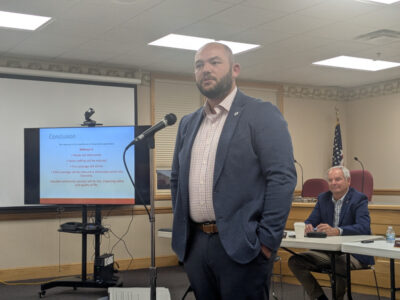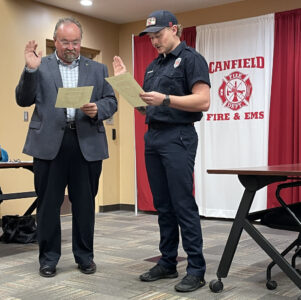McNally introduces two utility reform bills
State Rep. Lauren McNally, D-Youngstown, introduced two public utility reform bills — one in response to Ohio’s largest public corruption scandal and the other resulting from the 2023 East Palestine train derailment disaster.
One bill would ban public utility companies from engaging in politics with ratepayer money and the other designates Ohio Environmental Protection Agency and Public Utilities Commission of Ohio vehicles as emergency vehicles in certain emergency situations, such as the Feb. 3, 2023, derailment.
State Rep. Tristan Rader, D-Lakewood, is the other lead sponsor of the two bills.
“They’re not complicated bills,” McNally said. “They’re common-sense bills that will help the community. These are two very real issues that we’ve had to deal with locally and continue to deal with. They have health and financial implications.”
One bill bans utilities from using ratepayer money to lobby, make political expenditures or fund public relations campaigns, with fines levied if they violate those provisions. The bill also requires utilities to disclose an itemized list of their political expenditures.
It doesn’t prohibit public utilities from engaging in politics, but doesn’t permit them to use ratepayer money to do it, McNally said.
This stems from the House Bill 6 scandal that came to light in 2020. FirstEnergy Corp. gave $60 million to Larry Householder, then the Ohio House speaker, and others in exchange for a $1 billion nuclear bailout law and an effort to stop a repeal effort. Householder is serving 20 years in federal prison for the racketeering scandal while FirstEnergy admitted to the conspiracy and paid a $230 million criminal fine through a deferred prosecution agreement.
A portion of the bailout has been repealed.
McNally said: “There’s been slight movement on the Republican side to right the wrongs of the scandal. I hope the momentum will continue and it puts pressure on Republicans to approve policies such as this on utility companies.”
The other bill permits Ohio EPA and PUCO vehicles to be considered emergency vehicles during certain emergency situations, such as the East Palestine derailment. It would exempt them from certain traffic laws so they can operate more effectively in emergencies, McNally said.
“That’s a really low-hanging fruit objective,” she said. “It’s a simple no-brainer to respond faster to disasters. I tried to put it in the transportation budget and it didn’t get in there. We’ve been trying to get this into a bill for a while.”
About 50 Norfolk Southern railroad cars, including 10 carrying hazardous materials, derailed Feb. 3, 2023, in East Palestine. Five of the cars, carrying vinyl chloride, were purposely blown up three days later releasing the toxic chemical into the air.
The derailment and controlled explosion caused the evacuation of thousands of residents of East Palestine and nearby communities.
Several residents have concerns about long-term health issues from the release of toxic chemicals into the air, soil and water.
Nearly 70 emergency agencies responded to the East Palestine derailment.
“From every disaster we can learn something new and how we can better respond,” McNally said. “The East Palestine train derailment showed us that some emergency situations require specific public safety vehicles and personnel immediately.”



